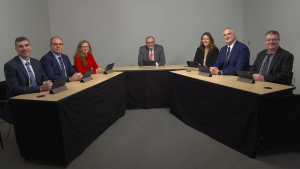Articles by Fred R. Hirsch, MD, PhD
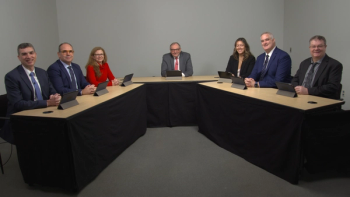
Providing Supportive Care to Patients with NSCLC
ByFred R. Hirsch, MD, PhD,Mary B Beasley, MD,Nicole Hall,Philip C. Mack, PhD,Daniel G Nicastri, MD,Nicholas C Rohs, MD,Christian Rolfo, MD Helping patients manage potential treatment-related adverse events is an essential part of the overall care plan in the treatment of non-small cell lung cancer. Experts provide strategies to address adverse events and best practices for providing the supportive care needed for patients.

Choosing the Optimal NSCLC Treatment
ByFred R. Hirsch, MD, PhD,Mary B Beasley, MD,Nicole Hall,Philip C. Mack, PhD,Daniel G Nicastri, MD,Nicholas C Rohs, MD,Christian Rolfo, MD A group of experts discuss the current treatment algorithm for NSCLC, as well as novel approaches under investigation, the impact of molecular biomarkers on their treatment decisions, and the importance of clinical trials.

Important NSCLC Biomarkers
ByFred R. Hirsch, MD, PhD,Mary B Beasley, MD,Nicole Hall,Philip C. Mack, PhD,Daniel G Nicastri, MD,Nicholas C Rohs, MD,Christian Rolfo, MD Fred R. Hirsch, MD, PhD, leads a discussion with his Mount Sinai colleagues about important biomarkers found in non-small cell lung cancer, including those that provide predictive and prognostic information.

Biomarker Testing Best Practices in NSCLC
ByFred R. Hirsch, MD, PhD,Mary B Beasley, MD,Nicole Hall,Philip C. Mack, PhD,Daniel G Nicastri, MD,Nicholas C Rohs, MD,Christian Rolfo, MD Non-small cell lung cancer experts share biomarker testing protocols and best practices for optimal outcomes, with a focus on overcoming challenges and nuances of testing.
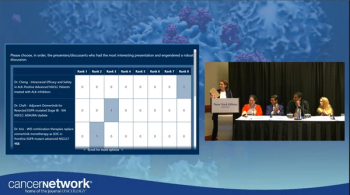
Cancer Network Faceoff: Conclusion of the Event and Presentation of Awards
ByDeborah Doroshow, MD,Neel Chudgar, MD,Vamsidhar Velcheti, MD,Daniel R. Gomez, MD,Jamie E Chaft, MD,Fred R. Hirsch, MD, PhD,Mark G. Kris, MD Conclusion of the discussion and award presentation.
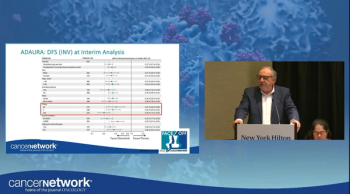
Optimal Approach for PD-L1 >50%
ByDeborah Doroshow, MD,Neel Chudgar, MD,Vamsidhar Velcheti, MD,Daniel R. Gomez, MD,Jamie E Chaft, MD,Fred R. Hirsch, MD, PhD,Mark G. Kris, MD Discussion regarding immunotherapy alone or in combination with chemotherapy for patients with NSCLC that are PD-L1 >50%.
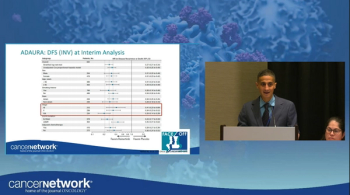
Treatment for Borderline Resectable Patients With NSCLC
ByDeborah Doroshow, MD,Neel Chudgar, MD,Vamsidhar Velcheti, MD,Daniel R. Gomez, MD,Jamie E Chaft, MD,Fred R. Hirsch, MD, PhD,Mark G. Kris, MD Discussion on the treatment for borderline resectable patients with NSCLC.
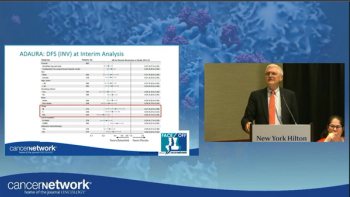
Will Combination Therapies Replace Osimertinib Monotherapy as Standard-of-Care in Frontline EGFR-Mutant Advanced NSCLC?
ByDeborah Doroshow, MD,Neel Chudgar, MD,Vamsidhar Velcheti, MD,Daniel R. Gomez, MD,Jamie E Chaft, MD,Fred R. Hirsch, MD, PhD,Mark G. Kris, MD Osimertinib monotherapy as the standard of treatment for frontline EGFR mutant advanced NSCLC will be replaced by combination therapies.
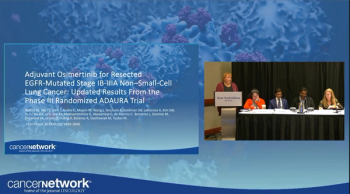
Adjuvant Osimertinib for Resected EGFR Mutated Stage IB-IIIA Non-Small Cell Lung Cancer
ByDeborah Doroshow, MD,Neel Chudgar, MD,Vamsidhar Velcheti, MD,Daniel R. Gomez, MD,Jamie E Chaft, MD,Fred R. Hirsch, MD, PhD,Mark G. Kris, MD EGFR-mutated stage IB-IIIA non-small cell lung carcinoma that has been removed and treated with adjuvant osimertinib.
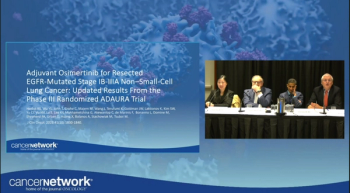
Brigatinib Versus Crizotinib in ALK inhibitor-Naïve Advanced ALK-Positive NSCLC: Results of Phase 3 ALTA-1L Trial
ByDeborah Doroshow, MD,Neel Chudgar, MD,Vamsidhar Velcheti, MD,Daniel R. Gomez, MD,Jamie E Chaft, MD,Fred R. Hirsch, MD, PhD,Mark G. Kris, MD Results of phase 3 ALTA-1L study comparing crizotinib with Brigatinib in advanced ALK-positive non-small cell lung cancer
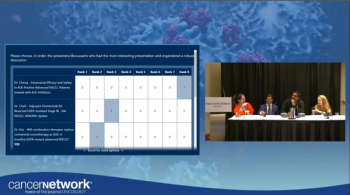
Introduction of the Debate Between Jets v. Giants
ByDeborah Doroshow, MD,Neel Chudgar, MD,Vamsidhar Velcheti, MD,Daniel R. Gomez, MD,Jamie E Chaft, MD,Fred R. Hirsch, MD, PhD,Mark G. Kris, MD An outline of the debate, the speakers, and the basic guidelines to support the program.

The Cancer Genome Atlas results have led to some encouraging advances in the clinical perspective on squamous cell lung cancer and spurred new initiatives targeting patients with squamous cell lung cancer, giving us hope for future improvements in clinical management and therapeutic outcomes for this subgroup of lung cancer patients.

On April 21, 2005, the Cancer Research and Prevention Foundation (CRPF), in conjunction with academic researchers, federal scientists, lung cancer advocates, and representatives of a number of pharmaceutical and diagnostic imaging companies, participated in a workshop held in Annapolis, Md, on the development of high-resolution spiral computed tomography (CT) imaging tools to assess therapeutic response in lung cancer clinical trials. In this report, we will address developments that led up to that workshop, what was discussed, and recommendations that came out of the meeting.

Inhibitors targeting the family ofepidermal growth factor receptors(EGFRs) are novel antitumor compoundsinvestigated in many cancertypes, including non–small-cell lungcancer (NSCLC). In this special lungcancer issue of ONCOLOGY, Drs.Buter and Giaccone provide us withan updated review of clinical researchon two classes of these agents inNSCLC: small-molecule tyrosinekinase inhibitors (TKIs) and monoclonalantibodies. The former classincludes gefitinib (Iressa) and erlotinib(Tarceva), two orally availablequinazoline derivatives targeting thetyrosine kinase domain of EGFR. Thelatter includes cetuximab (Erbitux), achimeric monoclonal antibody directedagainst EGFR. The authors extensivelydiscuss single-agent andcombination activities of these drugsin NSCLC.










